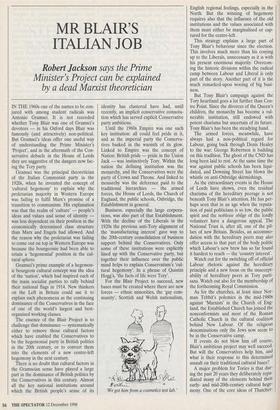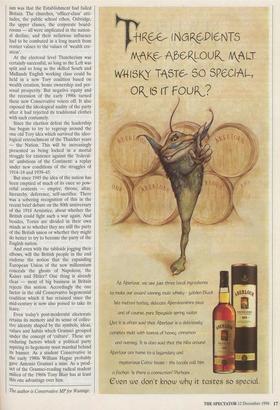MR BLAIR'S ITALIAN JOB
Robert Jackson says the Prime Minister's Project can be explained by a dead Marxist theoretician IN THE 1960s one of the names to be con- jured with among student radicals was Antonio Gramsci. It is not recorded whether Tony Blair was one of Gramsci's devotees — in his Oxford days Blair was famously (and attractively) non-political. But Gramsci's ideas offer one useful way of understanding the Prime Minister's `Project', and in the aftermath of the Con- servative debacle in the House of Lords they are suggestive of the dangers now fac- ing the Tory party.
Gramsci was the principal theoretician of the Italian Communist party in the 1920s, when he invented the concept of `cultural hegemony' to explain why the proletarian majority in Western Europe was failing to fulfil Marx's promise of a transition to communism. His explanation was that the realm of 'culture' — people's ideas and values and sense of identity was less dependent on their position in the economically determined class structure than Marx and Engels had allowed. And the reason why the proletariat was failing to come out on top in Western Europe was because the bourgeoisie had been able to retain a `hegemonial' position in the cul- tural sphere.
Gramsci's prime example of a hegemon- ic bourgeois cultural concept was the idea of the 'nation', which had inspired each of the main socialist parties to rally behind their national flags in 1914. New thinkers on the Left in Britain could use it to explain such phenomena as the continuing dominance of the Conservatives in the face of one of the world's largest and best- organised working classes.
The essence of the Blair Project is to challenge that dominance — systematically either to remove those cultural factors which have enabled the Conservatives to be the hegemonial party in British politics in the 20th century, or to convert them into the elements of a new centre-left hegemony in the next century.
There is no doubt that cultural factors in the Gramscian sense have played a large part in the dominance of British politics by the Conservatives in this century. Almost all the key national institutions around which the British people's sense of its identity has clustered have had, until recently, an implicit conservative connota- tion which has served explicit Conservative party ambitions.
Until the 1960s Empire was one such key institution: all could feel pride in it, and as the imperial party the Conserva- tives basked in the warmth of its glow. Linked to Empire was the concept of Nation: British pride — pride in the Union Jack — was instinctively Tory. Within the nation the defining institution was the monarchy, and the Conservatives were the party of Crown and Throne. And linked to monarchy was the deference paid to the traditional hierarchies — the armed forces, the House of Lords, the Church of England, the public schools, Oxbridge, the Establishment in general.
Business, especially the large corpora- tions, was also part of that Establishment. With the decline of the Liberals in the 1920s the previous anti-Tory alignment of the 'manufacturing interest' gave way to the 20th-century consolidation of business support behind the Conservatives. Only some of these institutions were explicitly lined up with the Conservative party, but together their influence over the public mind helps to explain Conservatism's 'cul- tural hegemony'. In a phrase of Quintin Hogg's, 'the facts of life were Tory'.
For the Blair Project to succeed, new bases must be created where there are new forces — ethnic minorities, the 'gay com- munity', Scottish and Welsh nationalism, We got him from a cosmetics test lab.' English regional feelings, especially in the North. But the winning of hegemony requires also that the influence of the old institutions and the values associated with them must either be marginalised or cap- tured for the centre-left.
This strategy explains a large part of Tony Blair's behaviour since the election. This involves much more than his cosying up to the Liberals, unnecessary as it is with his present enormous majority. Overcom- ing the historic divisions within the radical camp between Labour and Liberal is only part of the story. Another part of it is the much remarked-upon wooing of big busi- ness.
But Tony Blair's campaign against the Tory heartland goes a lot further than Cen- tre Point. Since the divorces of the Queen's children, the monarchy has become a vul- nerable institution, still endowed with potent charisma but uncertain of its future. Tony Blair's has been the steadying hand.
The armed forces, meanwhile, have always had a non-political regard for Labour, going back through Denis Healey to the war: George Robertson is building on this tradition. The ghost of the CND has long been laid to rest. At the same time the war against public schools has been liqui- dated, and Downing Street has blown the whistle on anti-Oxbridge skirmishings.
As the extraordinary events in the House of Lords have shown, even the residual charisma of the hereditary peerage is not beneath Tony Blair's attention. He has per- haps seen that in an age when the reputa- tion of paid politicians is so low, the public spirit and the noblesse oblige of the lordly volunteer have a dangerous appeal. The National Trust is, after all, one of the pil- lars of new Britain. Besides, an accommo- dation with the hereditary peers may also offer access to that part of the body politic which Labour's new brew has so far found it hardest to reach — the 'country interest'.
Watch out for the switching off of official Labour rhetoric against the hereditary principle and a new focus on the unaccept- ability of hereditary peers as Tory parti- sans. Watch out also for the membership of the forthcoming Royal Commission.
As for the churches, at least since Nor- man Tebbit's polemics in the mid-1980s against 'Marxists' in the Church of Eng- land, the Established Church has joined the nonconformists and most of the Roman Catholic Church in the cultural coalition behind New Labour. Of the religious denominations only the Jews now seem to be in the Conservative camp.
If events do not blow him off course, Blair's ambitious project may well succeed. But will the Conservatives help him, and what is their response to this determined assault on their traditional cultural bases?
A major problem for Tories is that dur- ing the past 20 years they deliberately repu- diated many of the elements behind their early- and mid-20th-century cultural hege- mony. One of the core ideas of Thatcher- ism was that the Establishment had failed Britain. The churches, 'officer-class' atti- tudes, the public school ethos, Oxbridge, the upper classes, the corporate board- rooms — all were implicated in the nation- al decline, and their nefarious influence had to be combated in a long march from rentier values to the values of 'wealth cre- ation'.
At the electoral level Thatcherism was certainly successful, so long as the Left was split and so long as the skilled South and Midlands English working class could be held in a new Tory coalition based on wealth creation, home ownership and per- sonal prosperity. But negative equity and the recession of the early 1990s turned these new Conservative voters off. It also exposed the ideological nudity of the party after it had rejected its traditional clothes with such contumely.
Since the election defeat the leadership has begun to try to regroup around the one old Tory idea which survived the ideo- logical retrenchment of the Thatcher years — the Nation. This will be increasingly presented as being locked in a mortal struggle for existence against the 'federal- ist' ambitions of the Continent: a replay under new conditions of the struggles of 1914-18 and 1939-45.
But since 1945 the idea of the nation has been emptied of much of its once so pow- erful contents — empire, throne, altar, hierarchy, deference, self-sacrifice. There was a sobering recognition of this in the recent brief debate on the 80th anniversary of the 1918 Armistice, about whether the British could fight such a war again. And besides, Tories are divided in their own minds as to whether they are still the party of the British union or whether they might do better to try to become the party of the English nation.
And even with the tabloids jogging their elbows, will the British people in the end endorse the notion that the expanding European Union of the new millennium conceals the ghosts of Napoleon, the Kaiser and Hitler? One thing is already clear — most of big business in Britain rejects this notion. Accordingly the one factor in the old Conservative hegemonial coalition which it has retained since the mid-century is now also poised to take its leave.
Even today's post-modernist electorate retains its memory and its sense of collec- tive identity shaped by the symbols, ideas, values and habits which Gramsci grouped under the concept of 'culture'. These are enduring factors which a political party aspiring to hegemony must marshal behind its banner. As a student Conservative in the early 1980s William Hague probably gave Antonio Gramsci a miss. As a prod- uct of the Gramsci-reading radical student milieu of the 1960s Tony Blair has at least this one advantage over him.
The author is Conservative MP for Wantage.











































































 Previous page
Previous page